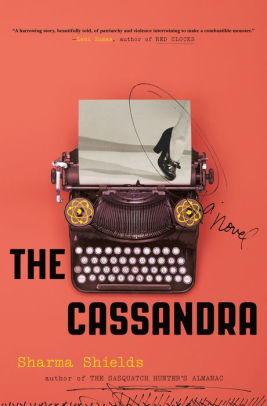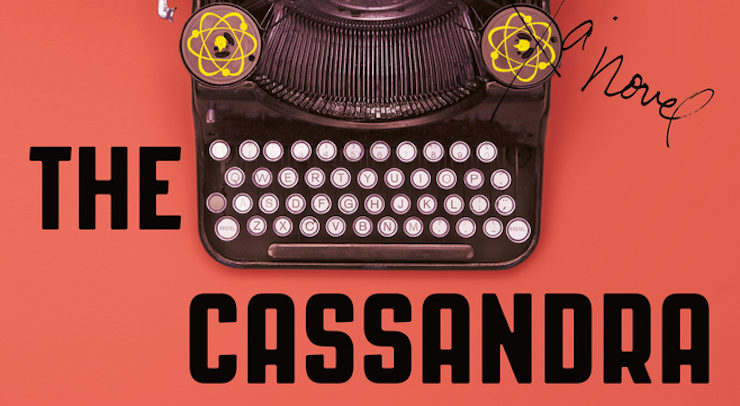Mildred Groves leaves her home for the first time in her life in 1944. In her early twenties, she has lived an isolated life in her small hometown where her only companions were her sharp-tongued, hypochondriac mother, her cruel and indifferent sister, and her weak-willed brother-in-law. But with the economy booming with war production and jobs ripe for the picking, she walks away from everything she knows. Really, she has no choice. A vision told her she would take a secretarial job at the newly built Hanford research facility in eastern Washington state. And so she goes.
Mildred has had visions of the future all her life, but they get more lurid and extreme at the camp. No matter who she tells or what she says, no one ever believes her, not even when they experience the very thing she predicted. Her Hanford friends are troubled by her sleepwalking, while her boss is fascinated, like a boy with a new toy. One man finds her oddness an acceptable price to pay for a potential bride, and another as an easy excuse to take what he wants without fear or consequence. As the violence of the real world begins to bleed into her visions, Mildred’s sanity collapses and she takes her frustrations out on her own body.
In this retelling of the ancient Greek myth of Cassandra, Mildred thinks herself a reliable narrator, yet she only sees as much as her visions want her to. To the rest of the world, she’s vulnerable, naive, and too batty to believe—but just eccentric enough to befriend. The violent and madding things she sees in her visions point to a terrible future of agonizing deaths and self-inflicted destruction on an unimaginable scale. When she not only fails to prevent it but is complicit in making it come true, whatever power sending her the visions—or perhaps the very prophecies themselves—punish her harshly.
There are no heroes here but there are plenty of morally compromised characters and wicked villains. Mildred’s only friend, a nurse called Beth, cares for Mildred deeply but conditionally. Beth’s love is powerful enough to forge an instant bond with the woman who looks like her dead sister but fragile enough to shatter when confronted with an unconscionable choice. And of the men, all are either proud and entitled aggressors or timid and submissive cowards. The protagonist, Mildred, should’ve been the hero, but as we know from mythology she’s doomed to fail at her heroic task. She thinks herself a good person, but she works hard assisting the man developing the worst weapon ever created even as she is haunted by the future spirits of the dead and diseased.
Historical fiction often does a pretty poor job of representing diversity in a realistic way. I could easily see a book like this being written by any number of authors, none of whom would even come close to what Sharma Shields achieves with The Cassandra. Granted, an overwhelming majority of the characters are white and straight, but she ensures a voice for those who aren’t. She doesn’t just talk about the many white men and women who worked on the homefront but the people of color who filled the ranks alongside them, especially the African Americans forced to work the dirtiest and hardest jobs for the least pay and live in segregated barracks.
Buy the Book


The Cassandra
One scene in particular stood out to me. In it, Mildred recalls being a child and watching her German immigrant grandmother Ingrid play cards with Nicky, a Sylix woman. Nicky mentions her daughter’s upcoming wedding and Mildred asks if Ingrid is attending, to which Nicky replies that she’s “settler blood. Like you. You are the uninvited.” In that moment, Mildred is thrown into a revelation about whiteness and colonialism that would later inform her knowledge about what havoc the atomic bomb would wreak. Nicky offers no apologies, excuses, or forgiveness, and Mildred must come to terms with the rewriting of her history:
I had been born here but my birth was a presumption. My home was in a region that my grandparents and great-grandparents had misshaped and bullied, that my parents and peers continued to bludgeon and disrespect. When I walked, I began to hear the very earth groan beneath my feet. What did it mean to be born white in this country, to speak a language germinated not here but overseas? To infest and control but to never belong or care for, like a parasite? What horrors had we committed, what horrors did we continue to commit, to the original inhabitants, Nicky and her kin?
Readers should beware that there are several instances of sexual violence. I wish content warnings were more commonplace, because it would’ve been nice to be able to prepare myself for that ahead of time. To give Shields credit, although she writes the moments of sexual violence as painfully uncomfortable and intense, she never allows them to feel obscene or gratuitous. I was grateful that Shields kept the focus on the survivor and never let the assaulter off the hook, both of which made the content a lot easier to deal with. She also used those moments to expose how much rape culture is embedded in our society and how sexism and misogyny go hand in hand with American nationalism and the patriarchy.
The Cassandra is a challenging novel. It’s a weird, discomfiting book of epic poetry and intimate prose that grows both more and less fictional with each passing page. Sharma Shields’ novel is a relentless rush, a distressing re-envisioning of one of the darkest points in world history where everyone comes out the other end worse than they were when they started. Yet it’s also utterly compelling and beautiful in unexpected ways. Like a prophecy, you may not get out of it what you expect or want but you will walk away with a new perspective.
The Cassandra is available from Henry Holt & Co.
Alex Brown is a high school librarian by day, local historian by night, author and writer by passion, and an ace/aro Black woman all the time. Keep up with her every move on Twitter and Insta, or follow along with her reading adventures on her blog.










